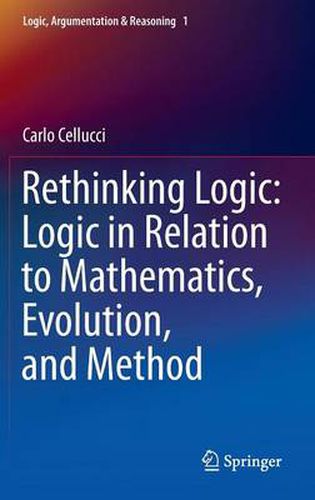Readings Newsletter
Become a Readings Member to make your shopping experience even easier.
Sign in or sign up for free!
You’re not far away from qualifying for FREE standard shipping within Australia
You’ve qualified for FREE standard shipping within Australia
The cart is loading…






This title is printed to order. This book may have been self-published. If so, we cannot guarantee the quality of the content. In the main most books will have gone through the editing process however some may not. We therefore suggest that you be aware of this before ordering this book. If in doubt check either the author or publisher’s details as we are unable to accept any returns unless they are faulty. Please contact us if you have any questions.
This volume examines the limitations of mathematical logic and proposes a new approach to logic intended to overcome them. To this end, the book compares mathematical logic with earlier views of logic, both in the ancient and in the modern age, including those of Plato, Aristotle, Bacon, Descartes, Leibniz, and Kant. From the comparison it is apparent that a basic limitation of mathematical logic is that it narrows down the scope of logic confining it to the study of deduction, without providing tools for discovering anything new. As a result, mathematical logic has had little impact on scientific practice.
Therefore, this volume proposes a view of logic according to which logic is intended, first of all, to provide rules of discovery, that is, non-deductive rules for finding hypotheses to solve problems. This is essential if logic is to play any relevant role in mathematics, science and even philosophy. To comply with this view of logic, this volume formulates several rules of discovery, such as induction, analogy, generalization, specialization, metaphor, metonymy, definition, and diagrams. A logic based on such rules is basically a logic of discovery, and involves a new view of the relation of logic to evolution, language, reason, method and knowledge, particularly mathematical knowledge. It also involves a new view of the relation of philosophy to knowledge. This book puts forward such new views, trying to open again many doors that the founding fathers of mathematical logic had closed historically.
trigger
$9.00 standard shipping within Australia
FREE standard shipping within Australia for orders over $100.00
Express & International shipping calculated at checkout
This title is printed to order. This book may have been self-published. If so, we cannot guarantee the quality of the content. In the main most books will have gone through the editing process however some may not. We therefore suggest that you be aware of this before ordering this book. If in doubt check either the author or publisher’s details as we are unable to accept any returns unless they are faulty. Please contact us if you have any questions.
This volume examines the limitations of mathematical logic and proposes a new approach to logic intended to overcome them. To this end, the book compares mathematical logic with earlier views of logic, both in the ancient and in the modern age, including those of Plato, Aristotle, Bacon, Descartes, Leibniz, and Kant. From the comparison it is apparent that a basic limitation of mathematical logic is that it narrows down the scope of logic confining it to the study of deduction, without providing tools for discovering anything new. As a result, mathematical logic has had little impact on scientific practice.
Therefore, this volume proposes a view of logic according to which logic is intended, first of all, to provide rules of discovery, that is, non-deductive rules for finding hypotheses to solve problems. This is essential if logic is to play any relevant role in mathematics, science and even philosophy. To comply with this view of logic, this volume formulates several rules of discovery, such as induction, analogy, generalization, specialization, metaphor, metonymy, definition, and diagrams. A logic based on such rules is basically a logic of discovery, and involves a new view of the relation of logic to evolution, language, reason, method and knowledge, particularly mathematical knowledge. It also involves a new view of the relation of philosophy to knowledge. This book puts forward such new views, trying to open again many doors that the founding fathers of mathematical logic had closed historically.
trigger